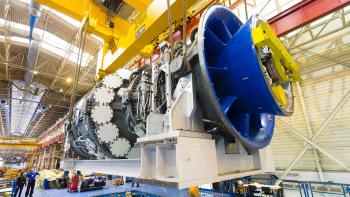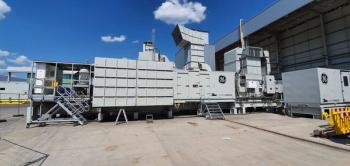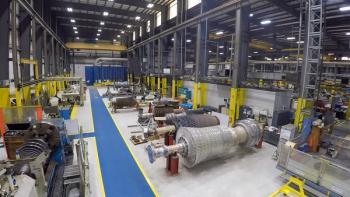
- November/December 2022
- Volume 63
- Issue 5
MITSUBISHI POWER
ORLANDO SERVICE CENTER PROVIDES BLADE/VANE MANUFACTURING AS WELL AS REPAIR AND REMOTE MONITORING SERVICES
Turbomachinery International recently toured Mitsubishi Power’s Orlando Service Center. Established in 2001 and expanded in 2008, the facility serves as a repair, service, and manufacturing center. The tour began in the Tomoni Hub which monitors more than 100 gas turbines throughout the Americas.
The Tomoni Hub leverages remote monitoring, digital control systems, predictive analytics, and AI to optimize power plants. It is the hub that provides support beyond monitoring. Operations specialists provide technical and operational assistance to customers 24/7. The Tomoni Hub also acts as a channel to O&M support for on-site personnel by providing real time operational support for the monitored fleet.
Prasanth Thupili, Senior Vice President of Power Generation Services at Mitsubishi Power Americas, said that the Tomoni Hub used to almost exclusively monitor gas turbines. But it now offers total plant monitoring including steam turbines and generators.
“We can do remote tuning and troubleshooting using augmented reality (AR) technology,” he said.
The Tomoni Hub receives a constant stream of data and metrics from its fleet. If something unusual is observed, combustor dynamics can be monitored and perform tuning remotely.
On the repair side, multiple in-house processes are offered. These include STEM machining (an acid electrolytic drilling technique), electrical discharge machining (EDM), milling, welding, brazing, thermal coating spray, coating removal, heat treatment, and various kinds of non-destructive examination (NDE).
The extent of the facilities was a big surprise. The entire center comprises a manufacturing and repair facility totaling about 190,000 ft2. The Mitsubishi Power Orlando Service Center manufactures vanes, blades, and compressor blades totaling approximately 15,000 parts per year.
“We manufacture turbine Row 1 and 2 blades in Orlando as these are the hot-test parts,” said Thupili. “The other rows are manufactured in Japan.”
He oversees an operation that includes gas turbine, steam turbine, and generator parts, fields service, specialty repairs, and an exchange program. He noted that the steam turbine service and repair business has picked up recently. This is due in part to delayed outages due to the COVID-19 pandemic.
“We have seen a surge in the scope of our steam turbine services to include a lot more onsite inspections and more unplanned work that needs to be done on blades and other components,” said Thupili.
The business has also taken on the role of servicing electrolyzers, including 40 massive Mitsubishi Power hydrogen electrolyzers that are being installed in the ACES project in Utah. That will involve onsite inspections when the facility commences operation in 2024. He doesn’t anticipate the need for shop inspections of these machines until around 2030.
“Customers want us to do more auxiliary work beyond the normal scope of gas turbine, steam turbine, and generator repair,” said Thupili. “They prefer a single entity to do everything rather than dealing with multiple parties.”
He noted that flexibility has become just as important to customers as reliability. Some want to reduce the load on their units, sometimes as low as 35%.
With the labor market being so tight these days, the company is investing in more robotics and tools so that its workforce can become more productive. Examples include a robot that can remove ceramic coating from parts and small robotic tools to check the health of generators during field inspections. These inspections are done in between the rotor and the stator.
“With this tool, we no longer need to take out the rotor,” said Thupili. “Instead of ten people needed for an on-site inspection and repair, it only needs a couple.” ■
Articles in this issue
almost 3 years ago
Avoiding Leakage & Breakagealmost 3 years ago
MYTH: LOGDEC….WHO STOLE MY DAMPING?almost 3 years ago
HYDROGEN TURBINESalmost 3 years ago
POWER RESILIENCEabout 3 years ago
METHANE CAPTUREabout 3 years ago
Show Report: Turbo & Pump Symposia 2022Newsletter
Power your knowledge with the latest in turbine technology, engineering advances, and energy solutions—subscribe to Turbomachinery International today.




